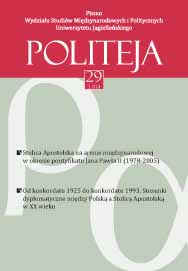Giovanni Paolo II: testimone della speranza
John Paul II: the witness of faith for Asia
Author(s): Thomas Hong-Soon HanSubject(s): Politics / Political Sciences
Published by: KSIĘGARNIA AKADEMICKA Sp. z o.o.
Keywords: papal teaching; international relations; Catholic social teaching; natural law; John Paul II; Asia
Summary/Abstract: Almost since the moment of becoming the head of the Holy See, John Paul II was aware of the mission that he was appointed with, the mission of leading the Church into the third millennium? In this perspective, the idea of the evangelization of the Asian continent became dear to him. The Pope emphasized that the Cross was established in Europe in the first millennium, in the American and African lands – in the second millennium, whereas in the third millennium, one should expect great fruit of faith to be reaped in such a vast and vibrant continent as Asia. The missionary activity of the Catholic Church in that part of the globe has been considerable for a long time. However, the Catholics constitute a relatively small community in Asia: 140 million of believers, i.e. 3,3% among 4,17 billion of people (more than 60% of the population of the world in 2010). Asia is not only the cradle of ancient cultures and civilizations, but also of the great religions of the world. This continent is marked by great cultural and religious differences which frequently lead to tension and conflict between nations. It is a continent with numerous contrasts, a continent with a widening gap between developed and underdeveloped areas, areas of immense poverty and areas of great wealth. Above all the most widespread phenomena include the lack of legal protection of unborn children, selective abortion according to the sex of the child and the rejection of religious freedom, especially of Christians, in many parts of the continent. After the decline of communism in Central‑Eastern Europe, John Paul II, a great missionary, perceived opportunities of conducting very vigorous evangelizational action in Asia. He conducted this missionary activity above all by social teaching in which he emphasized the necessity of transforming the social structures of this continent. He called for respecting human rights and a just distribution of goods and interhuman solidarity. The humanization of social life should serve the aim of democratization. According to the ideas of the Pope, both movements were supported by the local Catholic church which was supposed to be a factor in a three‑fold dialogue: the dialogue between cultures, religions and nations of Asia. Most of the apostolic pilgrimages conducted by John Paul II in Asia were devoted exactly to the furthering of this three‑fold goal, above all to the improvement of the fate of destitute people. By addressing the people of the countries that he visited in their native language he managed to maintain a perfect contact and to achieve extraordinary success. Everyone, both Catholics and the adherents of other religions, were surprised and they admired the efforts of the Pope concerning dialogue and understanding. John Paul II, the man who brought about the fall of communism in Central Europe, also contributed to the soothing of bad feeling in many Asian countries by eliminating ideological controversies.
Journal: Politeja - Pismo Wydziału Studiów Międzynarodowych i Politycznych Uniwersytetu Jagiellońskiego
- Issue Year: 11/2014
- Issue No: 29
- Page Range: 83-92
- Page Count: 10
- Language: Italian

